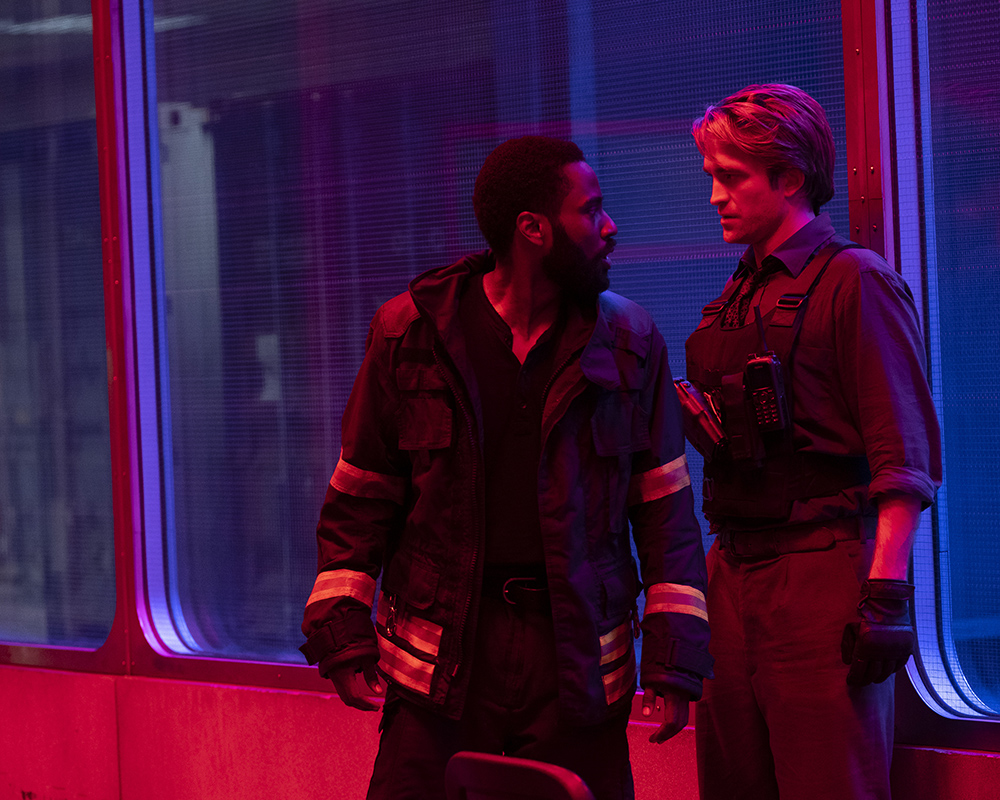Tenet review - a heady delight | reviews, news & interviews
Tenet review - a heady delight
Tenet review - a heady delight
Nolan's ambitious high concept head-spinner will have you going back for more

Go back over Christopher Nolan’s films and count the clocks. He has an obsession that would give a horologist a run for his money. Time is a continual motif of his body of work and it finds its zenith in his latest work Tenet.
At the heart of the story is The Protagonist (John David Washington, pictured below with Robert Pattinson), a highly trained agent who stumbles upon a time-bending technology controlled by a Russian arms dealer, Andrei Stor (Kenneth Branagh), who wants to trigger a time-driven cold war. It’s up to un-heroically named British spy, Neil (Robert Pattinson with a gleefully over-the-top RP accent), an art dealer called Kat (Elizabeth Debicki) and the enigmatically named hero, to stop the clock from not ticking.
This is a film where time flows in all directions. An opening sequence, set in the Taras Shevchenko opera house in Kiev, knocks the wind from your lungs and teases the time-twisting effects that saturate the final sequence. The film is full of breathless car chases that slip forwards and backwards simultaneously, with the intricate plotting all set against a globe-trotting array of backdrops ranging from Mumbai to the Amalfi Coast, via Tallinn and Oslo. This is cinema driven by an ambition to stagger and impress. And it does.

Tonally it’s a marriage of Interstellar and Inception, and seeks to deliver on previously explored concepts of fatalism, freewill and the nature of reality, while still managing to deliver yet new levels of visual spectacle and action. Like many of Nolan’s films, it’s jargon heavy, and full of doohickey McGuffin tech. Terms like "Temporal pincers" get used, there’s a Dummies Guide to Entropy dialogue, and also a brief schooling in The Grandfather Paradox. It perplexes, but let it wash over you, and save the details for an inevitable round two viewing.
Each component clicks with the next like a well-constructed timepiece. Whether it’s the pristine camera work of regular collaborator Hoyte Van Hoytema, the sharp costume design by Jeffrey Kurland, or the temporally twisted sonics of Ludwig Göransson’s score (Hans Zimmer was busy with Denis Villeneuve’s Dune), Nolan hones the elements to produce a film drenched with giddying concepts, and on a scale comparable to no other director.
As is often the case with Nolan, this methodical approach can feel cold. All that polish leaves little room for emotional pathos. At times the characters feel like cogs, lacking the necessary emotional drive, and becoming little more than archetypes present to deliver ideas rather than convey depth.
Still, Tenet remains a blissfully ambitious sci-fi, exceptionally crafted, and rich with ideas. Nolan remains unique in the cinematic landscape, being both Kubrick’s and Hitchcock’s heir apparent.
- Tenet is released by Warner Bros and in UK cinemas now
- More film reviews on theartsdesk
The future of Arts Journalism
You can stop theartsdesk.com closing!
We urgently need financing to survive. Our fundraising drive has thus far raised £49,000 but we need to reach £100,000 or we will be forced to close. Please contribute here: https://gofund.me/c3f6033d
And if you can forward this information to anyone who might assist, we’d be grateful.

Subscribe to theartsdesk.com
Thank you for continuing to read our work on theartsdesk.com. For unlimited access to every article in its entirety, including our archive of more than 15,000 pieces, we're asking for £5 per month or £40 per year. We feel it's a very good deal, and hope you do too.
To take a subscription now simply click here.
And if you're looking for that extra gift for a friend or family member, why not treat them to a theartsdesk.com gift subscription?
more Film
 Train Dreams review - one man's odyssey into the American Century
Clint Bentley creates a mini history of cultural change through the life of a logger in Idaho
Train Dreams review - one man's odyssey into the American Century
Clint Bentley creates a mini history of cultural change through the life of a logger in Idaho
 Palestine 36 review - memories of a nation
Director Annemarie Jacir draws timely lessons from a forgotten Arab revolt
Palestine 36 review - memories of a nation
Director Annemarie Jacir draws timely lessons from a forgotten Arab revolt
 Die My Love review - good lovin' gone bad
A magnetic Jennifer Lawrence dominates Lynne Ramsay's dark psychological drama
Die My Love review - good lovin' gone bad
A magnetic Jennifer Lawrence dominates Lynne Ramsay's dark psychological drama
 Bugonia review - Yorgos Lanthimos on aliens, bees and conspiracy theories
Emma Stone and Jesse Plemons excel in a marvellously deranged black comedy
Bugonia review - Yorgos Lanthimos on aliens, bees and conspiracy theories
Emma Stone and Jesse Plemons excel in a marvellously deranged black comedy
 theartsdesk Q&A: director Kelly Reichardt on 'The Mastermind' and reliving the 1970s
The independent filmmaker discusses her intimate heist movie
theartsdesk Q&A: director Kelly Reichardt on 'The Mastermind' and reliving the 1970s
The independent filmmaker discusses her intimate heist movie
 Blu-ray: Wendy and Lucy
Down-and-out in rural Oregon: Kelly Reichardt's third feature packs a huge punch
Blu-ray: Wendy and Lucy
Down-and-out in rural Oregon: Kelly Reichardt's third feature packs a huge punch
 The Mastermind review - another slim but nourishing slice of Americana from Kelly Reichardt
Josh O'Connor is perfect casting as a cocky middle-class American adrift in the 1970s
The Mastermind review - another slim but nourishing slice of Americana from Kelly Reichardt
Josh O'Connor is perfect casting as a cocky middle-class American adrift in the 1970s
 Springsteen: Deliver Me From Nowhere review - the story of the Boss who isn't boss of his own head
A brooding trip on the Bruce Springsteen highway of hard knocks
Springsteen: Deliver Me From Nowhere review - the story of the Boss who isn't boss of his own head
A brooding trip on the Bruce Springsteen highway of hard knocks
 The Perfect Neighbor, Netflix review - Florida found-footage documentary is a harrowing watch
Sundance winner chronicles a death that should have been prevented
The Perfect Neighbor, Netflix review - Florida found-footage documentary is a harrowing watch
Sundance winner chronicles a death that should have been prevented
 Blu-ray: Le Quai des Brumes
Love twinkles in the gloom of Marcel Carné’s fogbound French poetic realist classic
Blu-ray: Le Quai des Brumes
Love twinkles in the gloom of Marcel Carné’s fogbound French poetic realist classic
 Frankenstein review - the Prometheus of the charnel house
Guillermo del Toro is fitfully inspired, but often lost in long-held ambitions
Frankenstein review - the Prometheus of the charnel house
Guillermo del Toro is fitfully inspired, but often lost in long-held ambitions
 London Film Festival 2025 - a Korean masterclass in black comedy and a Camus classic effectively realised
New films from Park Chan-wook, Gianfranco Rosi, François Ozon, Ildikó Enyedi and more
London Film Festival 2025 - a Korean masterclass in black comedy and a Camus classic effectively realised
New films from Park Chan-wook, Gianfranco Rosi, François Ozon, Ildikó Enyedi and more

Add comment